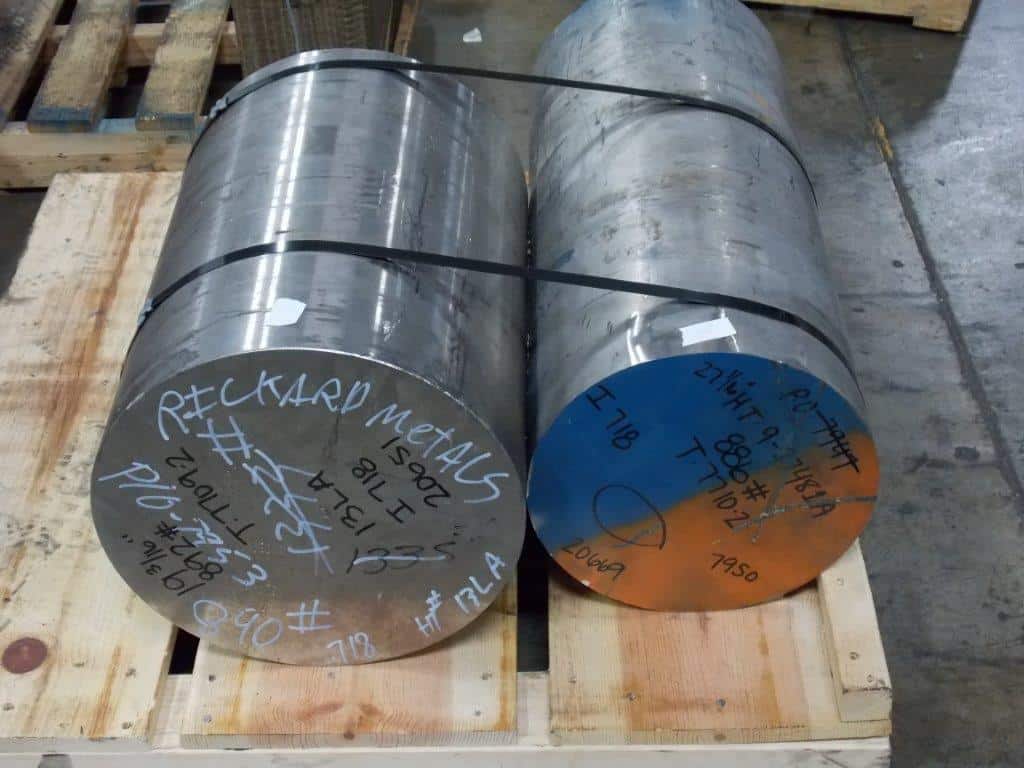Inconel 718 (UNS N07718) is the most widely used superalloy, accounting for approximately one-third of all superalloy production. IN718 has excellent strength, ductility, and toughness throughout the range -423 to 1300F. A major attribute of Inconel 718 is its processing versatility. It can be fabricated over a wide range of temperatures, forging reductions, and strain rates to produce microstructures and associated properties tailored for specific requirements.
Inco 718 is unique among nickel-base alloys because of its outstanding weldability and good resistance to strain-age cracking. The superior weldability characteristics are associated with the sluggish precipitation characteristics of the primary strengthening gamma-double-prime phase. Typical aerospace applications include compressor and turbine discs, buckets, spacers, and bolts for jet engines, liquid-rocket components involving cryogenic temperatures. Standard specifications include AMS 5596, AMS 5662 and more.
At Rickard Specialty Metals, we have 25+ years of experience supplying inco 718 forgings, plate, sheet and more to your custom measurements. Our forging process includes open die forgings, ring rolling and more. Additionally, we provide Inconel 718 heat treatment. See below for a list of common forged shapes we offer, including inconel 718 bar and rings, as well as additional product forms we offer.
NOMINAL COMPOSITION
- Ni+Co 55 max
- Cr 17 – 21
- Cb+Ta 4.75 – 5.5
- Mo 2.8 -3.3
- Ti .65 – 1.15
- Al .2 – .8
- Co 1 max
- C .08 max
- Mn .35 max
- Si .35 max
- P .015 max
- S .015 max
- B .006 max
- Cu .3 max
- Fe Balance
STANDARD SPECIFICATIONS
- AMS 5596
- AMS 5662
- AMS 5663
- AMS 5664
- AMS 5832
- ASME Case 2222-1
- ASME SFA 5.14
- ASTM B 637
- ASTM B 670
- EN 2.4668
- GE B50TF14
- GE B50TF15
- UNS N07718
- Werkstoff 2.4668
- PWA-S-5662 CLASS 2
- PWA-S-5663 CLASS 2
- B50TF15A-S32
- B50TF15B-S32
- B50TF15C-S32
- B50TF15D-S32
- B50TF15E-S32
- B50TF15F-S32
- F4
INCONEL 718 FORGINGS
- Inconel 718 Round Bar
- Inconel 718 Flat Bar
- Inconel 718 Rectangular Bar
- Inconel 718 Rolled Rings
- Inconel 718 Forged Rings
- Inconel 718 Disc
OTHER PRODUCT FORMS
- Inconel 718 Sheet
- Inconel 718 Plate
- Inconel 718 Extrusion
- Inconel 718 Extrusion angles
- Inconel 718 Billet
- Inconel 718 Ingot
- Inconel 718 Machined Parts
Inconel 718 Additional Information:
Physical Properties
Hardness: HRC 39 max, typical HRC 34-36.
Density: 0.296 lbs per cubic inch in the solution annealed condition and 0.297 lbs per cubic inch in the solution and precipitation heat treated condition.
Modulus of Elasticity: 29 msi in STA condition
Coefficient of Expansion: 7.9 x10-6 in/in/F RT-800F. 8.4 x10-6 in/in/F RT-1200F.
Machining
Inco 718 has a machining ability rating of 14. Like other nickel-base superalloys, the machinability of Inconel 718 is inferior to that of most steels including stainless steels. Nevertheless, with proper selection of tool materials, speeds, feeds, and coolants, it can be machined in either the annealed or age-hardened condition. The use of annealed material provides easier machining and longer tool life, but machining of the age-hardened alloy results in better chip action on chipbreaker tools and slightly better surface finish.
Welding
Inconel 718 has good weldability, particularly in conjunction with gas-tungsten-arc (GTA), plasma-arc, and electron-beam welding. Parent metal weld filler is typically used. Welding is generally carried out on solution annealed material, and appropriate post-weld heat treatment is employed to develop the desired properties. The precipitation hardened alloy is also weldable, but weld joints are relatively soft and weak until heat treated. A full post-weld solution anneal and precipitation heat treatment is often applied to obtain optimum properties in weldments.
Forming
Forming for IN 718 is good in the solution annealed condition.
Corrosion Resistance
Inconel 718 possesses excellent corrosion and oxidation resistance. It also has good sea water corrosion resistance and it is attractive for marine applications.
Heat Treatment
Heat treatment schedules for wrought Inconel 718 are based primarily on considerations of solution and re-precipitation reactions of the gamma-prime and gamma-double-prime phases for strengthening and of delta phase for grain size control. The heat treatments generally involve a high temperature anneal for solutioning of these second phases followed by one or two lower temperature aging treatments to re-precipitate the strengthening phases in the desired distributions.Some strengthening precipitate generally forms on cooling from the solution annealing temperature. The first aging treatment coarsens this precipitate as well as forming additional precipitate. The second lower temperature aging treatment promotes additional fine precipitate for improved tensile strength and creep rupture life.
Standard heat treatment for most specifications includes a solution heat treatment in the range of 1750F to 1800F, followed by a duplex precipitation heat treatment of 1325F/8 hours with a ~100F/hour cool down to 1150F, and holding an additional 8 hours at 1150F, for a total precipitation heat treat time of 18 hours, then AC. A second heat treat procedure involves slightly higher solutioning and aging temperatures. It is used for optimum ductility and low temperature toughness in heavy sections, although it can also produce notch brittleness in creep rupture and is not recommended for applications operating above 1000F. This heat treatment involves solution annealing above the delta solvus temperature, as follows: Solution heat treat at 1950F, one-half to one hour, AC or faster; duplex precipitation heat treat at 1400F.
Forging
Do to its good strength at elevated temperatures, Inco 718 has relatively high resistance to hot working. Inconel 718 is recommended at a hot-work range of 2050F maximum to 1650F minimum. Heating above 2050F is undesirable because of the danger of severe grain coarsening. In order to minimize creep notch sensitivity, the metal should be worked uniformly with gradually decreasing temperature and with relatively light finishing reductions (20 to 25 percent for open-die work and 10 percent for closed-die work) in the 1750 to 1650F range. The work piece should be reheated if any part cools below 1650F before the desired amount of reduction has been achieved.
Thermo-mechanical processing and heat treatments can be tailored to emphasize properties particularly desired for a given application. Higher tensile and fatigue strengths can be achieved by direct age processing than by standard processing. Improved fracture toughness results from heat treatment including a solution anneal at 1950F to 2000F than from one including a solution anneal at 1750F.
Mechanical Properties
Inconel 718 Bar and Forgings per AMS 5663 (solution and precipitation heat treated):
| Specimen Orientation | Tensile Strength | Yield Strength at 0.2% Offset | Elongation in 4D % | Reduction of Area % |
| Longitudinal | 185 KSI | 150 KSI | 12 | 15 |
| Long-Transverse (Forgings) | 180 KSI | 150 KSI | 10 | 12 |
| Transverse (Bars) | 180 KSI | 150 KSI | 6 | 8 |
Inconel 718 sheet and plate per AMS 5596 (after precipitation heat treatment):
| Tensile Strength | Yield Strength at 0.2% Offset | Elongation in 4D % | |
| Up to 0.010, inc | 180 KSI | 150 KSI | report |
| Over 0.010 to 1.00, incl | 180 KSI | 150 KSI | 12 |

